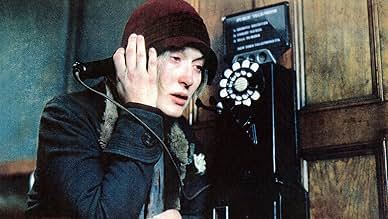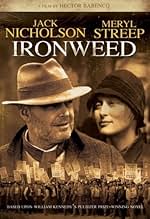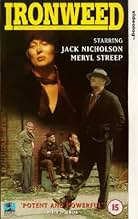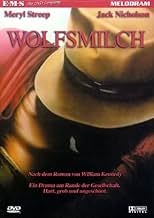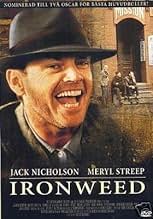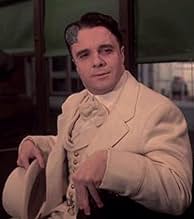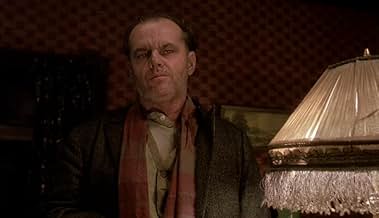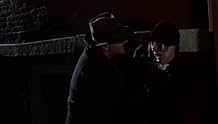AVALIAÇÃO DA IMDb
6,7/10
10 mil
SUA AVALIAÇÃO
Um vagabundo alcoólatra passa o Halloween em sua cidade natal, depois de voltar lá pela primeira vez em décadas.Um vagabundo alcoólatra passa o Halloween em sua cidade natal, depois de voltar lá pela primeira vez em décadas.Um vagabundo alcoólatra passa o Halloween em sua cidade natal, depois de voltar lá pela primeira vez em décadas.
- Indicado a 2 Oscars
- 2 vitórias e 4 indicações no total
Avaliações em destaque
There are many reasons why this film is a masterpiece, but the most significant element is surely Streep's portrayal of a homeless alcoholic in 1930's Albany. Her appearance, about half an hour into the film, is quite frankly, astonishing. She walks into a soup kitchen and sits down next to Nicholson and your jaw drops at the transformation. Beyond the technical virtuosity, you marvel at the choices that Streep makes that express the character so movingly, from the vocal production which is almost like a groan of pain, to the body language including her constantly averted glance and shuffling walk which express the woman's lost self esteem, to her bursts of rage when we see the glimmer of the spirit she once posessed. There's a scene in a bar in which she sings for the patrons that you will never forget.
Every other element of the film succeeds: the other performances (Nicholson, Tom Waits and Carol Baker stand out), the production design recreating a vanished era flawlessly without resorting to the phony perfection of say a Merchant Ivory film, the sound design which is surprisingly complex for such an intimate film, the screenplay, the cinematography, the direction. How is it that Hector Babenco has only made two films since this one?
Every other element of the film succeeds: the other performances (Nicholson, Tom Waits and Carol Baker stand out), the production design recreating a vanished era flawlessly without resorting to the phony perfection of say a Merchant Ivory film, the sound design which is surprisingly complex for such an intimate film, the screenplay, the cinematography, the direction. How is it that Hector Babenco has only made two films since this one?
Jack Nicholson usually relies on his quirky mannerisms and catch phrases; in this movie he shows his acting talents in a more serious manner. This movie is a brutal look at street people in the late 1930s. Meryl Streep immerses herself into her part as usual. This movie is harsh, cold and depressing. And the running time almost pushes two and a half hours long. I honestly don't know what they could have left out to make it shorter. Once is enough for this one. It will take a while for you to get your mind off of the abundance of hardship and sadness.
Nicholson and Streep are joined with a solid, diverse cast that includes Carroll Baker, Michael O'Keefe, Tom Waits, Nathan Lane and Fred Gwynne.
Nicholson and Streep are joined with a solid, diverse cast that includes Carroll Baker, Michael O'Keefe, Tom Waits, Nathan Lane and Fred Gwynne.
10copcigar
_Ironweed_ haunts for a long time after viewing, so be prepared. I also suggest that you be employed while you view this one.
William Kennedy's novel was an extreme work of beauty, and as much as I enjoyed and respected the novel, I never dreamed a film version could surpass it. In some ways at least, I believe this film does. Streep is luminous, no small feat while playing a drunk (they weren't called "homeless people" back then). And although he's proved it again since, this was the first time most of us saw Nicholson act. Tom Waits is terrific and gritty, Carroll Baker comes out of semi-retirement as though this was the one role she had left in her to play, and mixes pain and determination in just the right quantities.
Babenco clearly had a vision, and displays a maturity I hadn't expected from him. Even the score, a couple of tunes used over the opening and closing credits will make your heart ache.
It's all pathos, and it's all good. Grab it while you can -- I had to go to Canada and get a used copy online to find it at all. It was worth it.
William Kennedy's novel was an extreme work of beauty, and as much as I enjoyed and respected the novel, I never dreamed a film version could surpass it. In some ways at least, I believe this film does. Streep is luminous, no small feat while playing a drunk (they weren't called "homeless people" back then). And although he's proved it again since, this was the first time most of us saw Nicholson act. Tom Waits is terrific and gritty, Carroll Baker comes out of semi-retirement as though this was the one role she had left in her to play, and mixes pain and determination in just the right quantities.
Babenco clearly had a vision, and displays a maturity I hadn't expected from him. Even the score, a couple of tunes used over the opening and closing credits will make your heart ache.
It's all pathos, and it's all good. Grab it while you can -- I had to go to Canada and get a used copy online to find it at all. It was worth it.
Given that we often hear a rather idealized version of the Great Depression - it seems like some people go so far as to treat it as the "good old days" - it's important to understand just what things were like back then. Hector Babenco's ultra-downer "Ironweed" does that. Jack Nicholson plays drifter Francis Phelan, who returns to his home town (where he hasn't been in years) and traipses around it, seeing the poverty prevalent throughout the Depression. He deals with his own demons and sees whether or not he can start up a new life. But he can't escape the reality of the status quo, or of his own past.
Watching this movie, you may feel like you've just been drug through a gutter. But one must wonder how much better things are nowadays. For how terrible the Depression was, it helped our country understand not only abject poverty, but what caused the Depression. In this era of air-heads slacking off and using as many resources as possible, I wonder whether or not we might be headed towards a new kind of Depression. If so, then the movie warned us.
Anyway, I recommend this movie, but understand that it's a total downer. Also starring Meryl Streep, Carroll Baker, Michael O'Keefe, Diane Venora, Fred Gwynne, Tom Waits and Nathan Lane.
Watching this movie, you may feel like you've just been drug through a gutter. But one must wonder how much better things are nowadays. For how terrible the Depression was, it helped our country understand not only abject poverty, but what caused the Depression. In this era of air-heads slacking off and using as many resources as possible, I wonder whether or not we might be headed towards a new kind of Depression. If so, then the movie warned us.
Anyway, I recommend this movie, but understand that it's a total downer. Also starring Meryl Streep, Carroll Baker, Michael O'Keefe, Diane Venora, Fred Gwynne, Tom Waits and Nathan Lane.
I had seen this movie when it first came out, and just seemed hopelessly depressing. Good acting and sets, but a story with little hope for anyone. Recently I re-watched it and have an appreciation for its accurate depiction of alcoholism. I think this story could take place in any decade and have the same outcome. But the fact its in the depression era drives it all home that much harder. Francis (Nicholson) plays a down trodden bum all too familiar with the alleys and soup kitchens of 1938 Albany NY. He has a casual relationship with Helen (Streep) who seems very down on her luck too. If Francis can stay sober for a few days, the kind priest at the mission finds him odd jobs for pay. But soon as Francis works, he drinks again. Helen also is quite a drinker, and the two try to take care of each other finding places to sleep and getting food to eat. Paying attention to the dialog and flashbacks, the viewer learns Francis and Helen had fairly illustrious and gruesome pasts. Francis is prone to seeing many 'ghosts' haunt him still. In a way to confront his past, he returns to his wife and family he had abandoned after a tragedy a few decades earlier. He makes amends as best he can, but redemption seems to get more elusive for him. Not that the film takes any hard stance on alcoholism, but I'd say shows that it's truly an incurable disease that can torture a person to utter hopelessness and still continue. Past accomplishments, future dreams, true love and devotion and loss are all meaningless when there's another drink to be had. So the movie I don't think will either sober a true alcoholic up by watching it - but may help? Nor do I think it will encourage anyone to take up the profession seriously - unless they already have the infliction? But to the good christian that is naive to the vices many of us get addicted to, I think this movie realistically shows the destructive torment and survival alcohol can cause, regardless of success, tragedy, or current blight. Beautifully ugly.
Você sabia?
- CuriosidadesArgentinean director Hector Babenco said of this picture: "It is a movie that tries to embrace the territories of love, and it's also about the courage and beauty of people we don't usually think of as having deep and complex emotions."
- Erros de gravaçãoAs the trolley being driven by the scab played by Nathan Lane approaches the union protesters, there are no trolley tracks between the mob and the trolley. In the next shot, they suddenly appear in the dirt under young Francis' feet.
- Trilhas sonorasWhe You Were Sweet Sixteen
Words and Music by James Thornton
Principais escolhas
Faça login para avaliar e ver a lista de recomendações personalizadas
- How long is Ironweed?Fornecido pela Alexa
Detalhes
- Data de lançamento
- País de origem
- Idioma
- Também conhecido como
- Wolfsmilch
- Locações de filme
- Empresas de produção
- Consulte mais créditos da empresa na IMDbPro
Bilheteria
- Orçamento
- US$ 27.000.000 (estimativa)
- Faturamento bruto nos EUA e Canadá
- US$ 7.393.346
- Fim de semana de estreia nos EUA e Canadá
- US$ 36.973
- 20 de dez. de 1987
- Faturamento bruto mundial
- US$ 7.393.346
- Tempo de duração2 horas 23 minutos
- Cor
- Mixagem de som
- Proporção
- 1.85 : 1
Contribua para esta página
Sugerir uma alteração ou adicionar conteúdo ausente



